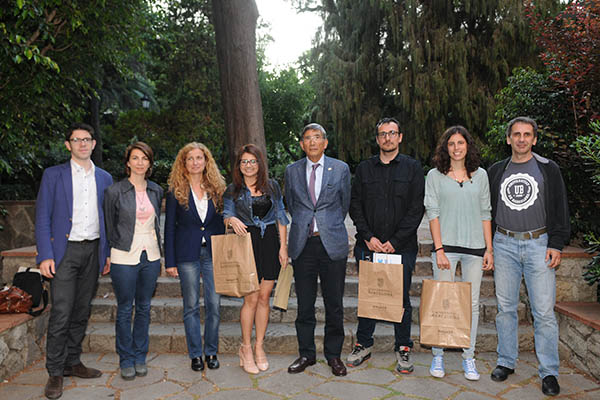This short-film contest, jointly organized by the Doctoral School and the UCC+I of the University of Barcelona (UB), encourages researchers in training to share their research with the general public. Joanna Sierpowska, PhD student of the Cognition and Brain Plasticity research group of Biomedical Research Institute of Bellvitge (IDIBELL), has received the ‘best video’ award of the 2nd edition of the Comas i Solà Contest for her video “Brain mapping”. This short-film contest, jointly organized by the Doctoral School and the UCC+I of the University of Barcelona (UB), encourages researchers in training to share their research with the general public.
In Brain Mapping, Joanna Sierpowska, student of PhD program in Biomedicine, shows her doctoral thesis proposal on brain mapping and its applications to neurosurgery patients. Sierpowska tells us how she researches new ways of intrasurgical monitoring on neurosurgery patients’ speech and how brain mapping can help decreasing postsurgical deficiencies on these patients. Also, she mentions the theory of the dual language route, in which she lays her projects’ methodology.
Joanna has been awarded with a 2.000-euro financial aid which have to be earmarked for a trip to focus on her doctoral studies as well as a free registration for any of the intensive language courses organized by the School of Modern Languages (EIM) in their summer offer for 2016, and a set of merchandising products of UB. The award ceremony, which took place in the hall of the Historical Building, there were the members of the jury Enric I. Canela, vice-Rector of Scientific Policy, Estrella Montolío, representing the Doctoral School; Olga Giralt, representing the Audiovisual Services of the University of Barcelona and Marga Becerra, representing the Scientific Culture and Research Unit (UCC+i) of the UB.
In addition to Sierpowska, PhD student Elisabet Tintó, with ap2-hs, un gen important en el paràsit de la malària?, has been awarded for the most original film, and Souza Pinheiro, with Un microscopio virtual, has been awarded for the most popular film. When deciding who the winners were, the jury assessed the originality of the films as well as their scientific rigour and the synthesis capability when explaining concepts and the clarity of the message so as to make the audiovisual work understandable for a non-specialized nor used to scientific language -audience.
All the audiovisual works that were submitted in the contest can be seen in the University of Barcelona’s Youtube channel.

